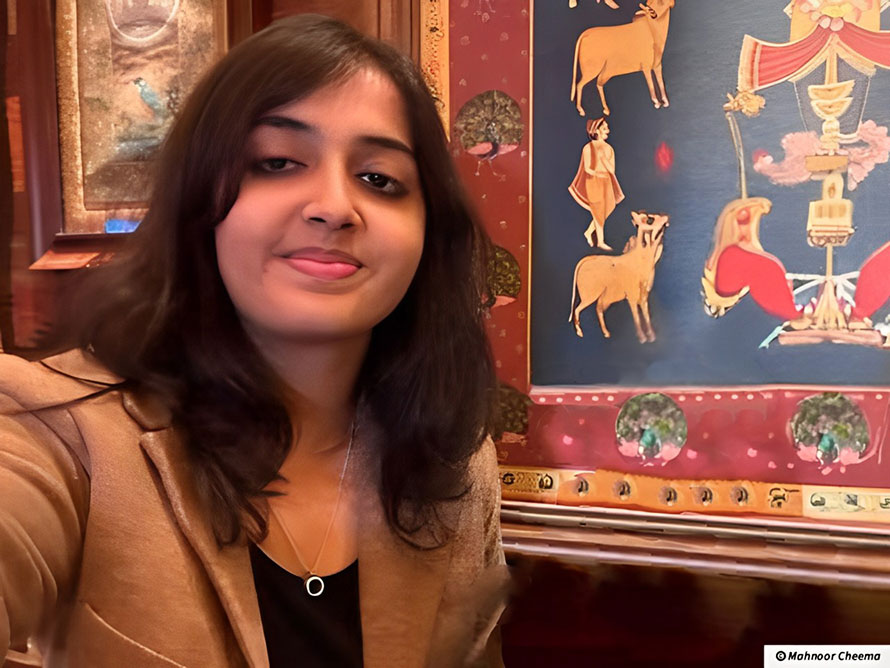But is she wasting her time? Mahnoor Cheema is studying everything from ancient history to marine science. Some believe she would be better off doing other things.
The new Einstein taking 28 A-levels at 17
But is she wasting her time? Mahnoor Cheema is studying everything from ancient history to marine science. Some believe she would be better off doing other things.
Exam stamina
Mahnoor has to make up her mind what to study today. She is doing four A-levelsThe national exams taken by 17 and 18-year-olds in parts of the UK. A-level grades are used to determine university places. at school, but another 24 at home. Perhaps it is time to focus on Latin... or history... or law...
She already has 34 GCSEsNational exams taken by 15 and 16-year-olds in England, Wales and Northern Ireland. . She spent just 10 days studying for each of them. When she got home from school she would sleep for an hour or two and then work until one or two o'clock in the morning. She ended up with 33 grade nines and one grade eight.
"I think I just have a good memory," she says. "It's my biggest tool. I tend to read and process things quite quickly and I'm good at scanning text."
But there is more to it than that. Her IQA means of measuring human intelligence. A person's IQ is usually ascertained by making them sit a standardised test. Some have criticised these tests as a means of evaluating intelligence, claiming that they ignore much of what it means to be intelligent. has been measured at 161, which is as high as EinsteinAlbert Einstein (1879-1955) was the most influential scientist of the 20th Century. His theory of relativity made the development of nuclear power - and the nuclear bomb - possible.'s was. And, she says, "My mum invested in a lot of brain-building activities when I was young, like arithmeticA branch of maths involving adding, subtraction, etc. , chess, classical music."1
Some people have accused her parents of being pushy. But according to one expert, children like Mahnoor push themselves: "They are extremely driven and it is stopping them that is the problem."2
Mahnoor could do A-level maths problems when she was at primary school, but was not allowed to move up a year. It was hard for her to make friends because she felt so different.
She thinks schools should do more to support gifted children: "I think there are so many kids who had talent to do so much, but it was wasted because no one recognised their potential."
She sat the entrance exams for every grammar schoolIn the UK, a state secondary school that select pupils with high marks in an exam taken at age 11. within 20 miles and scored almost 100% in all of them. But she complains that the one she chose said it was a bad idea for her to take so many GCSEs.
She does not think that she works too hard. She says that her parents have always made sure that she has a social life and gets involved in other activities: "So I play the piano, I do chess, I do swimming, I go out with my friends."
But is she wasting her time?
Yes: There is little point in studying for 28 A-levels, most of which will be irrelevant to what she does in later life. When she is older she will look back and regret not spending more time with friends instead.
No: Far too many people spend their lives thinking about a narrow range of subjects. It is great that she is broadening her mind, setting an example to others and encouraging schools to do better.
Or... She is not wasting her own time, but she is wasting her teachers'. She is obviously capableAble to do something. of teaching herself, so she should leave them to focus on students in greater need of their help.
Keywords
A-levels - The national exams taken by 17 and 18-year-olds in parts of the UK. A-level grades are used to determine university places.
GCSEs - National exams taken by 15 and 16-year-olds in England, Wales and Northern Ireland.
IQ - A means of measuring human intelligence. A person's IQ is usually ascertained by making them sit a standardised test. Some have criticised these tests as a means of evaluating intelligence, claiming that they ignore much of what it means to be intelligent.
Einstein - Albert Einstein (1879-1955) was the most influential scientist of the 20th Century. His theory of relativity made the development of nuclear power - and the nuclear bomb - possible.
Arithmetic - A branch of maths involving adding, subtraction, etc.
Grammar school - In the UK, a state secondary school that select pupils with high marks in an exam taken at age 11.
Capable - Able to do something.
The new Einstein taking 28 A-levels at 17
 Superbrain training: Mahnoor hopes to study medicine at Oxford University.
Superbrain training: Mahnoor hopes to study medicine at Oxford University. Glossary
A-levels - The national exams taken by 17 and 18-year-olds in parts of the UK. A-level grades are used to determine university places.
GCSEs - National exams taken by 15 and 16-year-olds in England, Wales and Northern Ireland.
IQ - A means of measuring human intelligence. A person’s IQ is usually ascertained by making them sit a standardised test. Some have criticised these tests as a means of evaluating intelligence, claiming that they ignore much of what it means to be intelligent.
Einstein - Albert Einstein (1879-1955) was the most influential scientist of the 20th Century. His theory of relativity made the development of nuclear power - and the nuclear bomb - possible.
Arithmetic - A branch of maths involving adding, subtraction, etc.
Grammar school - In the UK, a state secondary school that select pupils with high marks in an exam taken at age 11.
Capable - Able to do something.
